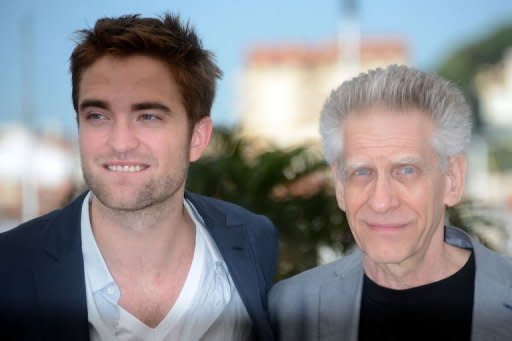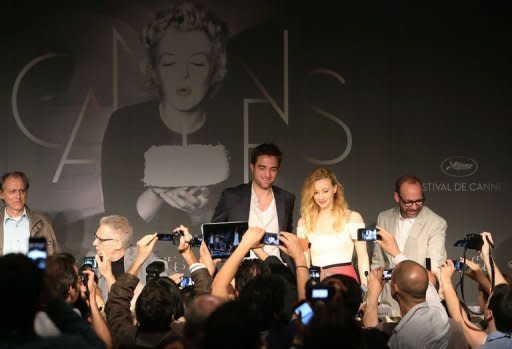Cronenberg, Pattinson bring 'Cosmopolis' to Cannes
Money, sex and stretch limos abound as David Cronenberg brought "Cosmopolis" to Cannes Friday, with Robert Pattinson as a billionaire financier looking for a haircut as a killer stalks him. The Manhattan thriller, adapted from Don DeLillo's 2003 novel, follows a day in the life of Eric Packer while he journeys in his elongated white car through a city in turmoil as the US president makes a visit. The age of capitalism is drawing to a close and chaos sets in as the day goes on and Packer watches his financial empire collapse due to frenetic fluctuations of the yuan on global currency markets. Along the way, he has an in-car tryst with his art dealer (Juliette Binoche), undergoes a mobile medical check-up, meets business associates, and gets a cream pie in the face from an anti-capitalist performance artist. He leaves his vehicle to breakfast, lunch and dine with his blonde heiress wife before their relationship takes a turn for the worse. "Cosmopolis", which got a polite reception at a press screening, is one of 22 movies in the running for the Palme d'Or top prize at the Cannes Film Festival to be awarded Sunday. Cronenberg, known for such creepy delights as "The Fly" and "Dead Ringers" as well as brutal dramas like "A History of Violence" and "Eastern Promises", said the decade-old book's prescient look at a crisis of capitalism did not require much updating. "You have to accept that you are creating a new thing that is a strange mutant hybrid of the book and cinema and so on," he told reporters. "But having accepted that, it literally only took me six days to write the script -- a new record for me -- but it was because the book had such a beautiful structure and fantastic dialogue." DeLillo said he had handed over the task of adapting his novel to Cronenberg because film and literature were "very different life forms". "I had nothing to do with the script and that's why the film turned out so well," he said. Cronenberg said he had picked Pattinson, the 26-year-old British heart-throb from the "Twilight" vampire movies, in part because he had a presence viewers would want to accompany through an entire day, even through bizarre and violent scenes. "If it's a fantastic face saying fantastic words you've got real movie-making," he said. Cronenberg told AFP later that the prescient novel had required little updating for the age of the Occupy movement against corporate greed, saying the story felt "weirdly, spookily, so exactly contemporary". One flourish was to change the all-powerful Japanese yen from the book to the ascendant Chinese yuan. "Japan had suddenly become not the powerhouse that everybody has been fearing for years like with the movie 'Rising Sun'," he said. "Now Japan is suddenly in terrible trouble and also had the tsunami and all of that so I thought, let's anticipate the yuan. I know nothing about finance but I did know that the yuan is eventually, probably by 2015, going to be the world currency." Pattinson said he had been intimidated by the size and scope of the part, particularly as Cronenberg notoriously offers little opportunity to rehearse on set. "I kind of spent two weeks in my hotel room worrying and confusing myself" before asking the director for some guidance, he said. "The one thing I knew about it is that I didn't want to change a single word and you were quite strict on that as well, even the punctuation," he said to Cronenberg. "And that made it easier, it's like you're doing a song instead of a movie." Pattinson said he didn't dare to improvise or experiment with the language on the page. "It becomes about ego and it's silly. Actors aren't supposed to be intelligent," he quipped. The festival gave Cronenberg, 69, a lifetime achievement award in 2006 and his movie "Crash" won a Special Jury Prize at the 1996 festival. Initials reviews for "Cosmopolis" were mixed. Britain's daily Guardian called it an "agonisingly self-conscious and meagre piece of work" while movie industry website Indiewire called it a "triumph" and London's Time Out said it was a "weird, heady and entrancing portrait of individual alienation".




